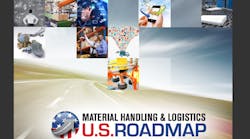Supply chain executives want to invest in powerful new technologies and business innovations to improve their supply chains, but are hampered by a shortage of qualified talent and pressure to cut costs, according to an industry report by MHI and Deloitte. The survey on which the report was based was completed by 450 respondents from large and small companies across a wide range of sectors, including: Retail and Wholesale, Consumer Packaged Goods, Automotive, Consulting, Life Sciences and Healthcare, Transportation and Warehousing, Material Handling and Supply Chain Equipment and Related Services. Most were senior executives, and more than half were C-level executives, Managing Directors, Senior Vice-Presidents, Vice-Presidents, or Directors.
Supply Chain Analytics and Multichannel Fulfillment were the top two strategic priorities of these respondents. The survey also revealed two major barriers to developing and adopting such innovations: a talent shortage and a continued focus on cost reduction.
“Finding qualified workers is already at a crisis point with baby boomers starting to retire and a scarcity of younger workers to replace them,” the report states. “And with the supply chain field expected to add 1.4 million new jobs by 2018, the issue will likely only increase in intensity.”
The report notes that while 70% of respondents cite “controlling costs” as a top priority, that focus might now be working against them, choking off investment in essential innovations that are the key to long-term growth, performance and efficiency. Although most respondents expect to increase their supply chain investments over the next three years, in many cases “it will be just enough to get by and not nearly enough to drive disruptive innovation and competitive advantage,” according to the authors.
The report identifies three emerging innovation areas that, while not yet top of mind, may be soon:
• Sustainability. While four out of five respondents say supply chain sustainability is at least “moderately important,” more than 60% admit to significant capability gaps that may be preventing them from implementing and fully benefitting from sustainability initiatives.
• Mobile and machine-to-machine (M2M) technologies. Although the large majority (70%) report significant capability gaps, 73% of companies plan to continue investing in this area, and nearly half expect their investments to increase over the next three years.
• 3D Printing. Only 17% of respondents view 3D Printing as a strategic priority, while 70% say they are not sure about its ability to transform supply chains by localizing production and enabling just-in-time manufacturing.




